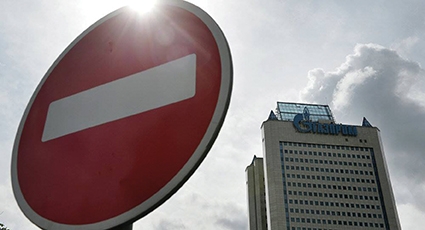Gas Diplomacy- Gazprom Brings in Uzbekistan, but Risks Losing Europe
Problems in negotiations with Turkmenistan are encouraging Gazprom to extend the procurement agreement with neighboring Uzbekistan, and the Russian company is waiting for the first visit of newly elected president Shavkat Mirziyoev to Moscow.
“The Uzbek leader's visit is planned for March-April this year,” says Putin's press secretary Dmitry Peskov. “During the visit, the two countries will sign a number of agreements in the field of tourism, health, education, medicine, chemistry, military-technical cooperation, migration policy, and energy. One of the central themes of the meeting will be energy agreements, in particular the extension of the gas purchasing contract to Uzbekistan.”
The new contract, which will expire in 2022, will see the supply volume negotiated.
“The contract is vital for Gazprom: due to the remoteness of their own fields in Central Asia, the company is forced to import gas from neighboring countries, the delivery of which is cheaper than transportation from origin,” Gazprom head, Alexei Miller, explained in 2013.
In fact, Central Asia is only the region where Gazprom buys gas for Uzbekistan from Kazakhstan and Turkmenistan.
In 2014, oil prices plummeted, and Gazprom announced the beginning of "optimization of procurement" of gas in Central Asia- in layman’s terms: a reduction.
Gazprom first tried to bargain with suppliers in Central Asia to lower prices for natural gas. Turkmenistan refused. As a result, Gazprom had to significantly reduce the volume of gas purchases from Turkmenistan, and in January 2016 completely tore up the contract. Since June 2015, the parties have been in the Stockholm Arbitration Court, where Gazprom demands Turkmenistan revise the price of Turkmen gas from 2010 to 2015 and return $2 billion of used gas to them.
The difference in Uzbek and Turkmen gas reaches a minimum value of $100 per thousand cubic meters. According to Gazprom, Turkmen gas costs $240 as opposed to the $140 purchased from Uzbekistan. However, a distinct lack of enthusiasm in Gazprom to buy gas from Uzbekistan is observed, and supply volumes are falling constantly. Where, in 2015, Gazprom imported 6.3 billion cubic meters of gas, in 2016 it planned to buy a total of 4 billion cubic meters.
“Perhaps it is the refusal of the Turkmen to make a gas price revision that explains the conclusion of the long-term contract with Uzbekistan. But if a price decrease is agreed with Turkmenistan, most likely supply would fall from Uzbekistan,” says head of the Oxford Institute for Energy Studies, Jonathan Stern.
“Turkmenistan is one of the most gas-rich countries in the world, with reserves at 13.4 trillion cubic meters. It’s already exporting gas to China and would like to send it to Europe. By redeeming gas from Turkmenistan, Gazprom would guarantee a lack of potential competitors in the supply to these two directions,” the expert believes.
“Historically, Gazprom wanted to buy Turkmen gas so Turkmenistan could not export to Europe or China. Uzbek gas does not pose such a danger: it is only available in Kazakhstan and Russia and other outlets have not been added,” says Stern. “Europe wanted Turkmenistan to join the Southern Corridor project, according to which gas from the Azerbaijani Shah Deniz field is to flow via Turkey to the EU in 2019. As for China, it has been supplied with Turkmen gas since 2009.”
If the supply of Turkmen gas to China increases, and it also delivers to the EU states, undoubtedly it will interfere with the future plans of Gazprom which intends to increase supply to these areas.
That said, even if such deliveries start, Turkmenistan is unlikely to be able to compete with Russia on the volume of supply to Europe or China. Total exports of Turkmenistan to Iran and China do not exceed 48 billion cubic meters per year, while export by Gazprom to Europe, according to BP, in 2016 reached 165 billion cubic meters. The fact that Gazprom has a reserved capacity of 200 billion cubic meters means the chances of winning the European market for Turkmenistan equals zero.
Turkmenistan will not be able to find that extra capacity of gas to sell to Europe or to increase export to China. At the same time, the fact that Gazprom is the guarantor of gas supply to Kyrgyzstan and Uzbek gas helps it to comply with these obligations.
Meanwhile, intractability is causing Turkmenistan “the gas-rich republic” to lose potential investors to Gazprom.
“If there was no conflict, Gazprom would invest in local gas export to Iran: delivering its gas to the poor northern regions. In exchange, Gazprom would receive Iranian gas in the south,” Stern suggests.
In the meantime, the monopoly prefers to invest in Uzbekistan. Gazprom has almost finalized a production sharing agreement (PSA) on the development of gas condensate field "Djel" in Uzbekistan (reserves of about 10 billion cubic meters). In addition to "Djel," Gazprom is already working on several projects, including Shahpaty, and a number of blocks in the Ustyurt region.
Dimitri Dolaberidze











